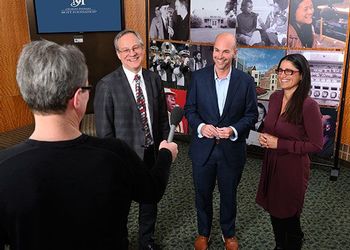Weaving Ethics Into the Fabric of MSU
One gift inaugurated the Ethics Initiative, another will ensure momentum as MSU brings people together from all areas of the university to create a foundation for weaving ethics into every aspect of teaching, research, and outreach.
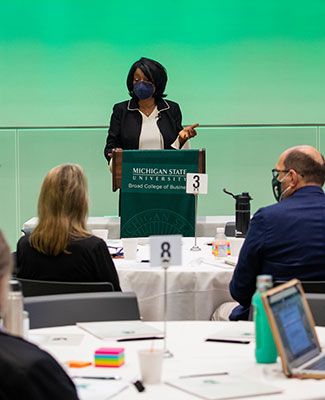
Weaving Ethics Into the Fabric of MSU
One gift inaugurated the Ethics Initiative, another will ensure momentum as MSU brings people together from all areas of the university to create a foundation for weaving ethics into every aspect of teaching, research, and outreach.
December 14, 2021We are at a critical moment in the history of MSU. We continue to navigate the path through the COVID-19 pandemic, which exposed stark disparities in our communities. We also remain mindful of the institutional failures laid bare by the 204 courageous women who stepped forward to share their stories of sexual abuse in 2018. Like the survivors, our campus and society can never go back to the way things were. But we can make sure these painful reckonings become our clarion call to action.
In MSU’s quest to build a better, more just future, ethics has emerged as a strong thread—one spun in green and white—that is becoming interwoven into every aspect of the university.
A year ago, donor Cyrus Farrehi challenged leaders in three colleges—Arts and Letters, Eli Broad College of Business, and Law—to think about how the university could put ethics at the heart of the MSU experience and followed it up with a $25,000 gift from the Farrehi Family Foundation that made a campus-wide symposium on ethics possible early this fall.
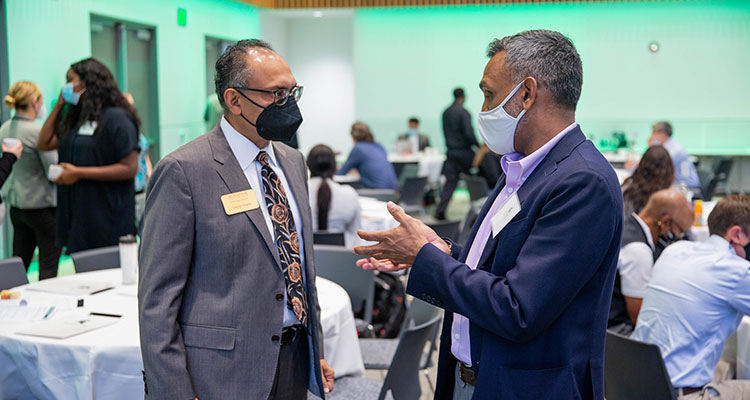
More than 200 faculty and staff enthusiastically raised their hands to come together for the symposium and to help shape the initiative, recognizing that every academic discipline and administrative unit at MSU represents essential interlacing strands in a fabric that bind us together.
President Samuel L. Stanley Jr., M.D., opened the day noting: “The ethical foundations of many institutions in our society are questioned daily. And many of those institutions, including Michigan State, have sometimes fallen short. But at MSU, we have the opportunity—and I would say the obligation—to ensure that ethics are at the heart of the MSU experience, both as an area of research excellence but also to practice in our everyday interactions at a fundamental level.”
At the end of the day, Provost Teresa K. Woodruff announced that a second, anonymous gift of $2 million would help create a proposed Institute for Global Ethics in Theory and Practice at MSU.
“We are grateful that at the end of our daylong discussion, donors have seen our vision and are providing support for our grand vision and plans. This is a testament to the vision, to the community who have joined in the planning, and to those who believe in the power of MSU to change,” Provost Woodruff said. “Our shared goal is to develop frameworks for ethical ways of knowing, thinking, and practice and to have these processes embedded into our students and on ourselves, creating a just and empowered university, and society.”
Every fiber of our being
What might it look like to put ethics at the center of Michigan State?
Such an undertaking requires that the entire university be mobilized to support the multidisciplinary study and application of ethics. It will involve joining forces and combining efforts to position MSU to reach the highest levels of ethics in education, research and outreach.
The three deans quickly agreed that in order for this effort to be successful, it must be led by the faculty. So, we can be proud of the committee of 13 faculty who brought together the 200 thought leaders from 17 colleges and from every major administrative unit at the university to contemplate how to elevate the importance of ethics in all that we do.
The outpouring reflected MSU’s recently completed strategic plan, which represents a broad framework for aligning efforts and moving the university forward. Ethics is a fundamental and recurring concept in this plan, essential for future success.
The symposium featured two speakers who discussed the philosophical and practical dimensions of an ethics institute. Anita Allen, the Henry R. Silverman Professor of Law and professor of philosophy at the University of Pennsylvania, discussed how interdisciplinary outreach, practice and pedagogy come together. Kirk O. Hanson, senior fellow of the Markkula Center for Applied Ethics at Santa Clara University, discussed how centers and institutes are created to work collaboratively.
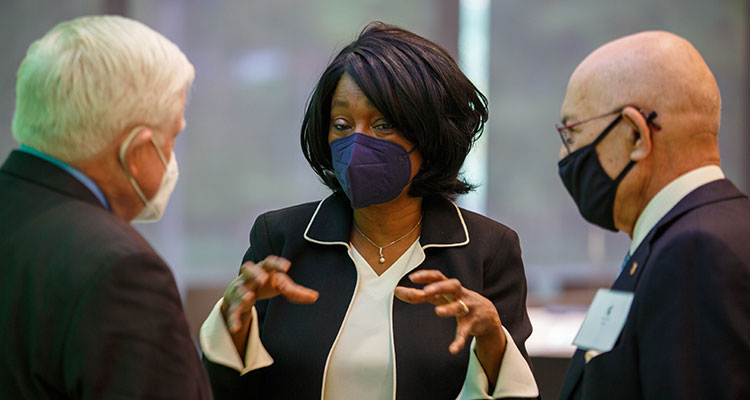
One outcome of the symposium will be a publication that highlights the work of MSU’s faculty in ethics, as well as the new ideas brought forth in the symposium to elevate ethics throughout MSU. The new institute will enable MSU to build on these ideas to find new and effective ways to cultivate generations of ethical leaders.
“We want our students to recognize that they can’t be good professionals unless they are also good human beings.”
—Father Jake Foglio. The Foglio Chair in Spirituality, named in his honor, is one example of MSU’s efforts to improve the human condition.
As MSU brings the full weight of its expertise to bear on the question of how to make an MSU education synonymous with ethical thinking and acting, Spartans will be known for an unwavering commitment to ethical leadership and integrity. Then the fabric of MSU will be of the strongest cloth, thoughtfully woven thread by thread through research, practice and reputation.
Right Place, Right Time
How Cyrus Farrehi saw MSU’s role in ethics
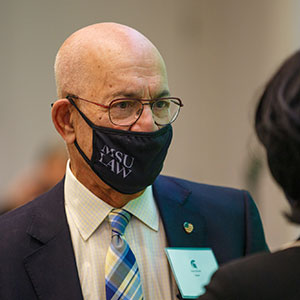
Ideally, the Ethics Symposium is just a start.
That was Cyrus Farrehi’s hope when he made a $25,000 gift to help get the day of thoughtful discussion off the ground at Michigan State.
A retired physician, Cyrus was guided by medical ethics throughout his career, but his knowledge of the role that classical ethics can—and, he thinks, should—play in solving problems in the world at large is not to be ignored.
He believes Michigan State is a great place for an entire institute devoted to the study and application of classical ethics in today’s life.
Why? Because Cyrus believes that any university—as a place that holds an enormous volume of knowledge and plurality, plus a platform of dissemination and application—is duty-bound to such principles in the hope of ensuring peace and happiness among the population it serves.
“Our nation is facing a number of problems more severe than in the memory of most living people,” Cyrus says, “and they are unresolved despite the good intentions and hard work in many sectors.”
“Being deeply divided as to what are the present problems or solutions, I think the medium of ethics, grounded in reason and reasoning—not in emotion, authority or divine intervention—has the potential to gather us all in one place to create such a list and form a hierarchy of significance. This is not to simply change labels, titles or perspectives, but to address the correct use of language, to give human reason its proper place; to define nectars and poisons of our day; and to ultimately separate light from darkness.
“MSU is a major, publicly supported state institution. Among our expectations is for it to clarify the problems and offer the needed solutions. Revival of ethics in its proper place of primacy and potency in both individual conduct and in formation of public policy will go a long way to regenerate trust, tranquility and togetherness among us.”
LEARN MORE about how you can support ethics at MSU by contacting Principal Gifts Executive Director Malissa Burke at burkemal@msu.edu or by phone at (517) 884-1020.


